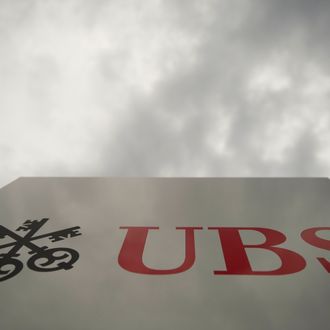
It’s weird to most people that, in the year 2012, it’s huge news when a Wall Street bank pleads guilty to a crime. It’s weirder still that it’s huge news when a Wall Street bank even considers pleading guilty to a crime.
But such is the world we live in, and so today we get the groundbreaking, earth-shattering news that UBS, one of the many banks involved in setting Libor (the interest rate that basically everyone admits was rigged) is “in final negotiations with American, British and Swiss authorities to settle accusations that its employees reported false rates, a deal in which the bank’s Japanese unit is expected to plead guilty to a criminal charge.” That would make UBS “the first big bank to agree to criminal charges in more than a decade,” according to DealBook.
This is a big deal! Banks do not “plead guilty” to things. They draw up settlements in which they neither admit nor deny wrongdoing but agree to pay big fines and promise not to break the same laws again.
There are often good reasons for this. As Felix Salmon explained earlier this week in regard to HSBC’s $1.9 billion fine (which came with a deferred prosecution agreement, which is not exactly the same as allowing it to get off with no charges but works out to about the same thing in practice), charging banks with crimes — as opposed to charging individual bank employees with crimes — often carries unintended consequences like putting them out of business entirely and doing real damage to the markets they operate in. In other words, declining to prosecute banks criminally is not always about protecting them — sometimes it’s about protecting everybody.
It’s not clear how or why federal prosecutors decided that UBS’s alleged Libor-rigging was more deserving of criminal charges than any of the other financial misdeeds of the past ten years. (Or, for that matter, more worthy of charges than Barclays, which was not prosecuted even though its traders were caught rigging Libor and generally acting like idiots over e-mail.) Perhaps they decided that, by going after only UBS’s Japanese unit, they could construct the charges in a way that would limit the damage done to the bank as a whole.
I’m with Matt Levine in thinking that since it’s hard to calculate actual monetary damages from Libor-rigging, the size of the fine UBS is reportedly willing to pay to settle — which, at anywhere close to the $1 billion figure that is being kicked around, would be substantially bigger than the $450 million paid by Barclays — is likely a sign that there are some damning e-mails lurking in UBS’s file, showing that the bank’s Libor submitters either fudged their submissions by a lot or fudged them in a very stupid way that will look terrible once exposed to public view.
But I’ll add that if prosecutors have decided that they’re comfortable making UBS the pilot case of a new charging-banks-with-crimes program, despite the damage it could do, the UBS e-mails must be really, really damning — the kind of thing that makes bottles of Bollinger look like child’s play.





























